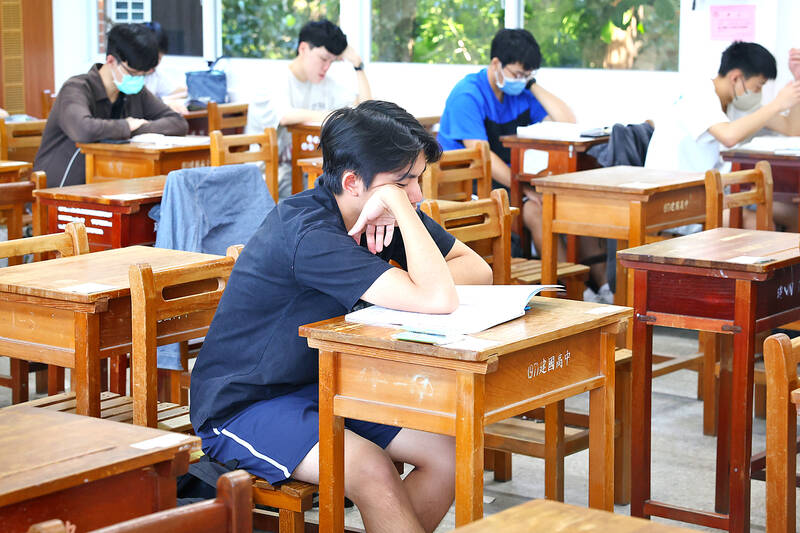Thge curriculum guidelines introduced by the government in 2019 has led to “learning fatigue” in children, the Child Welfare League Foundation said on Sunday, citing a recent survey.
The league announced its findings at a news conference Sunday to report on the academic progress of Taiwan’s students this year.
The survey suggests that 60 percent of the nation’s children are enrolled in after-school cram schools, the foundation said, adding that the number could be higher than 70 percent in cities.

Photo: CNA
About a quarter of students attend cram schools more than five days a week, with about 60 percent staying at their institutions until 9pm; and 20 percent attending classes until well after 10pm.
Considering that an average student takes two hours for study at home, those enrolled in cram schools could be doing school work for more than 10 hours learning a day — longer than most adults’ working hours.
The foundation said the survey results indicate that more than 93 percent of children sleep less than eight hours a day due to the amount of studying, while about 37 percent get five to six hours’ sleep a day, it said.
With so much time studying and too little sleep, students in Taiwan average only one hour of exercise a week, it said.
Moreover, the main source of stress observed in Taiwanese students comes from the high number of quizzes and tests in a standard week in both schools and cram schools.
On junior and senior high-school students specifically, league official Huang Yun-hsuan (黃韻璇) said that based on the foundation’s findings, the two main sources of students’ stress come from school work and worrying about their future.
The foundation attributed the problems to the “Curriculum Guidelines for 12-Year Basic Education,” officially introduced in 2019.
The foundation said the education plan’s aim was to provide a greater variety of classes for students to design their own curriculum.
Huang said the league’s latest statistics reveal there is still an excessive amount of cram school programs and tests, an on-going phenomenon observed around Taiwan — the focal point of students’ learning fatigue.
The government should re-examine extracurricular activities and curricula to provide students with a more well-rounded education, Huang said, adding that the 12-year plan is clearly unable to help the needs of Taiwan’s students.
With the survey showing that almost 60 percent of students are uncertain about their future prospects, Huang urged parents to pay more attention to their children’s physical and mental well-being, adding that the future achievements of Taiwan’s children should no longer be measured based on grades and diplomas.

EVA Airways today confirmed the death of a flight attendant on Saturday upon their return to Taiwan and said an internal investigation has been launched, as criticism mounted over a social media post accusing the airline of failing to offer sufficient employee protections. According to the post, the flight attendant complained of feeling sick on board a flight, but was unable to take sick leave or access medical care. The crew member allegedly did not receive assistance from the chief purser, who failed to heed their requests for medical attention or call an ambulance once the flight landed, the post said. As sick

A drunk woman was sexually assaulted inside a crowded concourse of Taipei Railway Station on Thursday last week before a foreign tourist notified police, leading to calls for better education on bystander intervention and review of security infrastructure. The man, surnamed Chiu (邱), was taken into custody on charges of sexual assault, taking advantage of the woman’s condition and public indecency. Police discovered that Chiu was a fugitive with prior convictions for vehicle theft. He has been taken into custody and is to complete his unserved six-month sentence, police said. On Thursday last week, Chiu was seen wearing a white

The Taichung District Court yesterday confirmed its final ruling that the marriage between teenage heir Lai (賴) and a man surnamed Hsia (夏) was legally invalid, preventing Hsia from inheriting Lai’s NT$500 million (US$16.37 million) estate. The court confirmed that Hsia chose not to appeal the civil judgement after the court handed down its ruling in June, making the decision final. In the June ruling, the court said that Lai, 18, and Hsia, 26, showed “no mutual admiration before the marriage” and that their interactions were “distant and unfamiliar.” The judge concluded that the couple lacked the “true intention of

EVA Airways, one of the leading international carriers in Taiwan, yesterday said that it was investigating reports that a cabin crew manager had ignored the condition of a sick flight attendant, who died on Saturday. The airline made the statement in response to a post circulating on social media that said that the flight attendant on an outbound flight was feeling sick and notified the cabin crew manager. Although the flight attendant grew increasingly ill on the return flight, the manager did not contact Medlink — a system that connects the aircraft to doctors on the ground for treatment advice during medical